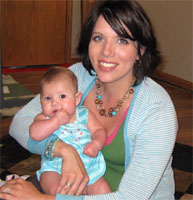This is a continuation from part one, Abortion Survivor Reflects on the Pain of Her Miscarriage.
“Was this pregnancy planned?” the doctor asked Ryan and I, as we sat in her office the morning after our ultrasound, for what was to be our first scheduled prenatal appointment, but which had also turned out to be our last. I had already been crying in the office for well over five minutes before she asked us this, after initially trying to put on a brave face for the nurse, who compassionately let us know that she had seen the results of the ultrasound and knew what we knew, while kindly giving us her condolences for our loss. I had the look about me of a woman who had experienced a deep loss, who was going through something traumatic; literally I had been crying more on than off for over 24 hours and had the looks about me to prove it. Yet, seeing my mournful state, the doctor still inquired whether our pregnancy was planned. I sensed that somehow she thought she was doing the right thing by asking us this, but really?! Was she under the belief that if our pregnancy was unplanned that losing our child didn’t hurt as much? That maybe somehow I was grateful, deep down inside, that our child had passed away? If she said something like that to me, knowing full well that I’m an abortion survivor and take such words very seriously, what did she say to other women, to other couples?
 Just as I knew throughout the preceding weeks when God was opening my eyes and widening my heart for what was to come, the loss of our child, sadly, I knew at that moment in the doctor’s office that this was just the beginning of the journey for me. I knew that there was much, much more I was going to experience throughout this process of loss that would forever change me and even affect what I believe about abortion.
Just as I knew throughout the preceding weeks when God was opening my eyes and widening my heart for what was to come, the loss of our child, sadly, I knew at that moment in the doctor’s office that this was just the beginning of the journey for me. I knew that there was much, much more I was going to experience throughout this process of loss that would forever change me and even affect what I believe about abortion.
My eyes were once again opened, as I proceeded later that morning to the pre-op appointment for the S & C, suction and curettage, that was scheduled for me for the following day. Hearing words like miscarriage, surgery, D & C, S & C, are painful and scary enough for any woman, but for me, as an abortion survivor, the words pierced my heart like a knife. I stayed up all hours of the night after finding out about the loss of our child, praying for his soul, praying for our family’s healing, and praying that God would finish what had been started, so that I didn’t have to go through the trauma of having the S & C done. It sounded too much like an abortion. I couldn’t stand the thought of them taking what was left of our child, even if it didn’t include his body. But that was not His plan. Physically, my body had been struggling to complete the miscarriage for weeks, and it was apparent that I would not be able to do this on my own
Due to a quick scheduling change on the part of the medical office, I headed into the appointment by myself , having convinced myself and my husband that I could do it alone. It wasn’t going to be a big deal, just some paperwork, right? I felt deeply sorry for the medical clerk who greeted me that morning, who could see my tear-streaked and swollen face, my jaw set in an attempt to hold off an outpouring of my continued grief, and still had to process me through like every other patient, knowing, full well, what I was there for, my referral from the OB-GYN lying in front of her. In the midst of my own trauma, I reflected at that moment on how it must be for the staff at abortion clinics. How do they handle a woman as she walks through THEIR doors? Is she just another patient? Do they see her tears? Her pain? As I grabbed a seat with my back to the door and gratefully, most of the patients, I couldn’t help but wonder about how many other women do the same each day? Whether in cases of miscarriage like ours, or in the case of an abortion, how many women enter a medical facility alone and face the wall so that they can try to blend in with the wallpaper like me?
As I looked around the room at all of the women, most with swollen, pregnant bellies, and still others with their newborns, all waiting to be seen by the doctors, I was overcome with grief. If I could have found a corner of the room to throw up in, I would have. But instead, I sat frozen in my seat, swollen tears falling from my face as I tried to shut out all that I saw and all that I felt churning inside of me. It was ironic to be sitting there, knowing that my child had died and I now had to complete the process of losing him with medical assistance, while so many women around me were full of life or had just given birth to their children. As I struggled to keep myself pulled together, I was reminded of something I have said to others, time and time again as a pro-life speaker: “We never know what someone has gone through or is currently going through in their life, so it’s important not to judge or condemn them, but simply show love to them.” Looking around that room, I wanted desperately to have been one of the other women, to not have our child lose his life, but who was I to judge? Who was I to know what those women had been or were going through? As I look longingly at a family with two children, a pregnant woman, a woman with her newborn, I remind myself of this still every day.
Although every piece of that day, including my pre-op appointment, preparing myself and my family for my surgery the next day, and sadly, telling our darling Olivia about the loss of her sibling were impactful and eventful, for the sake of time, I will fast-forward to the day of my surgery. As Ryan and I sat in my room at the surgery center that Wednesday morning, and as each medical professional interacted with us, it felt surreal. This couldn’t be me that I saw all of these things happening to? I felt detached from myself. I felt numb. I was grief-stricken over our child’s death. I had never had surgery before, so I was scared out of my mind. And despite my husband sitting right there with me, I felt so alone. As the anesthesiologist asked me what the surgery was for, I thought I was going to scream out loud from the pain, and all the while, I wondered, “Do they think that I want to do this? Do they know what happened? Do they know that our child is already gone?” And once again, I started to think about all of the women who have abortions. What does an experience like this have to be like for them? How must they feel?
As I followed the nurse down the long hallway to the operating room that morning, the sobs once again racked my body. I wanted to keep what was left of our child. I didn’t want to do this. I felt so alone. As I climbed up onto the operating table, my sobbing increased. I didn’t want to hyperventilate and make all of it even worse, but I couldn’t stop my crying. “I’m so sorry,” I told the nurses, as they prepped me for surgery and tried to support me. “It’s not you or what you are doing, it’s just been a rough few days. It’s so painful,” I remember telling the trio of nurses surrounding me. “We know, honey, we’re so sorry for you,” the nurse said, as she began the IV-drip. “This will help you calm down.” Every step that I took down that hallway, every tear I shed as I lay on the operating table, in the midst of my own pain, I couldn’t stop thinking about the women who have abortions. With all of the love and support that I had from my husband, family and friends, I still felt so alone, so scared. What must it be like for a woman who has no support? I knew what had happened to our child and about the procedure that I was going through. What about the women who are not educated about the development of their child, who is not told the truth about the abortion procedure, its’ potential complications, its’ consequences?

Recent Comments